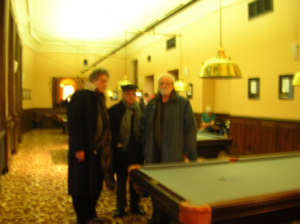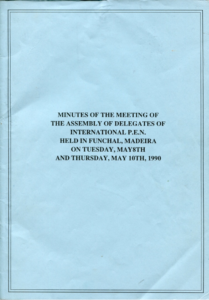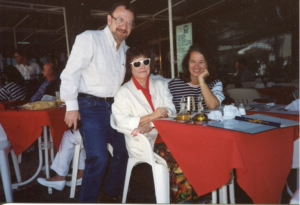Posts Tagged ‘Madiera’
PEN Journey 6: Freedom and Beyond…War on the Horizon
PEN International celebrates its Centenary in 2021. I’ve been active in PEN for more than 30 years in various positions and now as an International Vice President Emeritus. With memories stirring and file drawers of documents and correspondence bulging, I am a walking archive and have been asked by PEN International to write down memories. I hope this personal PEN journey is of some interest.
PEN members played key roles in the shifting landscape of Europe in the early 1990’s as the Berlin Wall fell, and the East moved closer to the West. Playwright and PEN member Vaclav Havel, who spent multiple stays in prison for his opposition and activism against the Communist regime, was elected President of Czechoslovakia in December, 1989. Czech writers Jiri Stransky and Jiri Grusa, both of whom spent time in jail under the Communists, later worked with Havel. Jiri Stransky became President of Czech PEN, and Jiri Grusa worked in the Ministry of Foreign Affairs and later was elected President of PEN International in 2003. Dissident Hungarian writer Arpad Goncz, whose name was on the program of the 55th PEN Congress as a member of the Hungarian delegation, was prevented from coming because on the day he was to depart, he was elected President of Hungary.

Czech PEN members playwright Tom Stoppard, Jiri Grusa (President of PEN International) and Jiri Stransky (Czech PEN President) at historic restaurant in Prague in 2005
At PEN’s 55th Congress in Madeira, Portugal May,1990, Hungarian novelist Gyorgy Konrad was elected President of International PEN after the unexpected death of President Rene Tavernier. According to the interim and past President Per Wastberg, Konrad had been “very active in the spiritual liberation not only of his own country, Hungary, but of Eastern and Central Europe.”
Konrad told the Assembly of Delegates, “It had been the spirit of human rights, which corresponded with the main interest of the freedom of the mind and of literature, which had been the motive force in recent events in Eastern Europe so that it had been the spirit, rather the physical force, which had caused the shifts in power.” [But] “liberated from the uneasy situation of the censorship of the one-party system, writers there were facing a new sort of danger, the danger of conflicts between nationalities spurred on by national chauvinism. If it was possible to find understanding between writers in that very disturbed part of Europe, maybe it would also be easier to find understanding between the governments and the peoples. Therefore the PEN Centers and their members could perhaps form the avantgarde of this understanding.”
The East German delegate noted it was “the writers, theatre people and artists of the GDR who had blown that trumpet and done a great deal to bring about the collapse [of the wall.] It was they who had called for a huge demonstration on 4th November, at which two million people had gone out onto the streets of East Berlin, demanding changes.” The GDR PEN Center had also “blown the trumpet much earlier when they had supported Vaclav Havel and demanded his release from prison, which, at that time—more than a year ago—had been a thing not without danger in the GDR,” he said.
Yet the breaking up of the Communist regimes with their centralized authority was also leaving in the wake difficult conditions for many writers. Their publishers were closing, their livelihoods shrinking, and the West was taking over. “This did not mean that the writers of the GDR did not wholeheartedly go out onto the streets when they were called on to demonstrate for freedom of expression of writing, of thought and of travel,” the East German delegate said. But “now they had to take the harder road to freedom as Brecht had put it, with a proud bearing, even if they might lose in the process.”
The delegate from Poland saw two major problems ahead: “The first was political: the danger that the remnants of Stalinism might ally with the proponents of extreme right chauvinism. To overcome this danger it was necessary that the new democracies should be stabilized. The second problem was cultural: to find models for cultural life in their countries. They did have a very serious crisis in the domain of publication.”
Because of the collapse of currencies and income in these countries and the withdrawal of state support for arts and culture, it was increasingly difficult for the writers and PEN centers to pay their dues to International PEN and to find funds to travel to conferences and congresses. This situation also existed for many writers in Africa and Latin America where PEN had expanded its centers. In 1990 there were 96 PEN centers around the world.
At the Madeira Congress, PEN set up a Solidarity Fund to which countries with stronger currencies and income could contribute to assist their fellow members. The Assembly of Delegates formalized a procedure for a small, but broad-based committee to make these grant decisions. I was asked by the two American Centers to represent them on the committee, which also included representatives from Zimbabwe, Cote d’Ivoire, Polish, Soviet Russian, Canadian, English and French PEN Centers. Looking back, this new, more democratic process for dispersal of funds foreshadowed major change in PEN International’s own governing structure, change that was to come by the end of the decade.
“The collapse of the Berlin Wall…only provided an entry into the Promised Land…[but did not] overcome all the problems of coping with liberty for the first time,” reflected International Secretary Alexander Blokh to the Assembly of Delegates. “Now was the honeymoon period between East and West, but there was cause to fear that it might not last…While the trumpets of Jericho still sound in our ears, we should take steps to face up to these problems and iron out possible misunderstandings.” For this purpose PEN had held and was holding conferences in Vienna and Budapest with writers in the region.
The Congress discussion around the tectonic changes in Europe and the impact elsewhere occurred in idyllic Funchal, the capital city of Portugal’s Madeira archipelago, surrounded by hills, set on an expansive harbor with gardens and flowers everywhere. A cable car took delegates to the top of the island which offered sweeping views of the hillside neighborhoods and the town below. My specific memories are of bougainvilleas and the beauty of the setting, of the combined joy and worry of colleagues who used to emerge from the “Iron Curtain” to attend PEN gatherings, and now felt relief in their freedom but uncertainty about their lives and the future of their countries.
I remember specifically the establishment of the Solidarity Fund which operated in the 1990’s to help bridge the economic differences within PEN so that all centers could participate. PEN’s policy, though with exceptions, was that a center had to pay its dues in order to vote in the Assembly. Gilly Vincent, who later assisted the International PEN Foundation, remembers working late one winter’s night in the International PEN office when the doorbell rang. She went downstairs to find the Secretary of Polish PEN standing in the shadows at the front door. He had come to pay his Center’s dues in cash. She took the envelope and invited him in so that she could give him a receipt. He replied: “No. We carry no receipts” and vanished into the darkness, she recalls.
My memory of the Madeira Congress includes sharing meals with colleagues from Eastern Europe and with the Russian poet Yevgeny Yevtushenko, author of the famed Babi Yar who attended as a delegate from the new Soviet Russian PEN Center. [At the Vienna Congress a year later in November, 1991 the Soviet Russian PEN Center got approval to change its name to Russian PEN after the August coup where the Center had issued a statement “true to the best traditions of PEN”.] Yevtushenko, dressed as I recall in rather flamboyant clothes—all white suits (or were they all red or plaid?) commanded attention wherever he went. In the Assembly he spoke in support of a new Belarusian Center which he said would symbolize the democratization of the Soviet Union. He said its members would be helpful in the common fight on behalf of persecuted writers. He spoke in support of the Kurdish Writers Abroad Center changing its name to the Kurdish Center so that Kurdish Writers in Turkey wouldn’t be accused of “separatism” for joining it. And he supported PEN holding a conference in Alexandria, Egypt, where he said PEN must do everything possible to help Salman Rushdie and must ask Arab colleagues in Alexandria for support.

Richard Bray (PEN USA West Executive Director ), Carolyn See (PEN USA West President), and Joanne Leedom-Ackerman at the 55th PEN Congress in Madeira, Portugal
At the Writers in Prison Committee meetings and at the Assembly, PEN delegates also focused on the continuing crackdown in China, on the persecution of writers, editors and publishers in Turkey, Myanmar, Vietnam, Sudan, Cuba, and El Salvador. They protested the house arrest of the renowned novelist Pramoedya Ananta Toer in Indonesia. In May, 1990 PEN recorded 381 cases of writers in prison or banned. In spite of the changes in Eastern Europe, the numbers of persecuted writers had not declined worldwide, and there were still some cases in Central and Eastern Europe. PEN resolved to act in all these areas, but the seismic shift in the political landscape of Europe held the focus for the 55th Congress whose theme for the literary sessions was Language and Literatures: Unity and Diversity.
The breakdown of the Communist states was already leading to heightened nationalism, in no place more acutely than in the Republic of Yugoslavia. While most PEN members defended the move towards freer and more tolerant societies, there were some who espoused the nationalistic sentiments that led to the war which eventually broke out in the Balkans. A few took leadership roles in that conflict and separated from PEN which had centers in the former Yugoslav republics—Serbian PEN, Croatian PEN, and Slovene PEN. Only Slovene PEN attended the Madeira Congress. Slovene PEN had long been the annual host for PEN’s Peace Committee which met in Bled, Slovenia, an idyllic town on a lake where it was difficult to imagine war.
But war was on the horizon in the Balkans. What no one anticipated was that war was also on the horizon in the Middle East for in less than three months after the Madeira Congress, Iraq invaded Kuwait. By January, 1991 America and 39 other nations were at war with Iraq. The upcoming PEN Congress in Delphi, Greece had to be cancelled; the conference in Alexandria had already been cancelled at the Madeira Congress. Two months later, in March 1991 the first shots were fired in the Balkans in a war that would last four years.
Next Installment: PEN in Times of War and Women on the Move